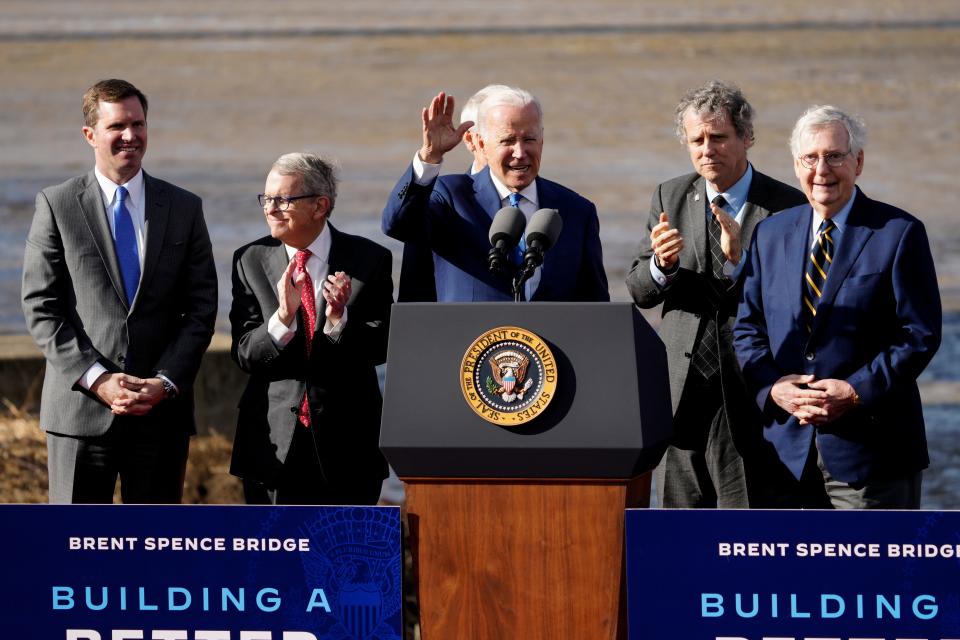The war and Athens| Could council vote be a bad sign for Joe Biden and Sherrod Brown?
- Oops!Something went wrong.Please try again later.
- Oops!Something went wrong.Please try again later.
- Oops!Something went wrong.Please try again later.
Thomas Suddes is a former legislative reporter with The Plain Dealer in Cleveland and writes from Ohio University. tsuddes@gmail.com
Coincidentally, but perhaps tellingly, Sen. J.D. (James David) Vance, a Cincinnati Republican, occupies the Senate seat once held by another Cincinnati Republican, the first Robert A. Taft, an eloquent critic of U.S. foreign policy who voted against United States membership in NATO in 1949.
Vance isn’t calling for that, but he made some interesting observations on the North Atlantic alliance at the recent Munich Security Conference, observations suggesting Vance, when not auditioning as Donald Trump’s prospective running mate, has been thinking long and hard about foreign policy.
Vance’s comments came after Trump’s harsh criticism of Europe’s NATO members for what Trump says is underinvesting in the alliance, and his threats to make tightwad NATO members to go it alone if faced by Russian aggression.
More: 'Highly' intelligent J.D. Vance's spiteful position on Ukraine a danger to the world
(As for Vance’s assertion that, of recent presidents, Trump was the most effective in deterring Russian president Vladimir Putin, that’s something for historians to assess after the war in Ukraine ends.)
“No, I don’t think that we should pull out of NATO, and no, I don’t think that we should abandon Europe,” Vance said, deftly distancing himself from Trump, at least pending any job vice-presidential job interviews at Mar-a-Lago.
“But yes,” said Vance, “I think that we should pivot. The United States has to focus more on East Asia. That is going to be the future of American foreign policy for the next 40 years, and Europe has to wake up to that fact.”

Vance also said, and some big-picture policy journals seem to agree, that “fundamentally the limiting factors for American support of Ukraine, it’s not money, it’s munitions. America, and this is true, by the way, of Europe too, we don’t make enough munitions to support a war in Eastern Europe, a war in the Middle East, and potentially a contingency in East Asia. So, the United States is fundamentally limited ... and we need our European allies to step up in Europe.”
All in all, Vance said, “[the Ukraine war] will end in a negotiated peace. The question is when it ends in a negotiated peace and what that looks like.”
The war in Athens
![Ohio University seniors, Sophia Evangelisti, left, and Julia Casella, walk through the college green in Athens, Ohio, on Sept. 17, 2020. As part of the first phase, depending on major and needs, some students are permitted to take in-person classes and be part of extracurricular activities at OU. Phase two will be implemented shortly and more students will arrive in dorms and on campus for classes. [Gaelen Morse/Dispatch]](https://s.yimg.com/ny/api/res/1.2/CaMtiq2TMr26O9juTp8_iQ--/YXBwaWQ9aGlnaGxhbmRlcjt3PTk2MDtoPTY0MA--/https://media.zenfs.com/en/the-columbus-dispatch/2156e2596e17645594354b69ee22e79a)
War and peace were also on the agenda last week in one of Ohio’s most Democratic cities. Athens. And that should send a warning signal to President Joseph R. Biden’s strategists.
In 1972, Athens and Lucas were the only Ohio counties to vote for Democrat George McGovern for president rather than Richard M. Nixon. In 2004, Athens was the only county to vote “no” on an Ohio constitutional amendment to forbid same-sex marriage in Ohio. And in 2020, while Ohio cast 53.2% of its statewide vote for Donald Trump, Athens County gave Trump 41.6%.
Statewide this fall in Ohio, assuming Joseph Biden and Trump are their parties’ respective nominees, Biden at best faces a steep uphill statewide battle.
Yet a big Democratic turnout in Ohio, regardless of the presidential vote, is crucial for the re-election of Democratic Sen. Sherrod Brown, of Cleveland, and for Democrats to at hold their own in the Ohio Supreme Court.
But you have to wonder just how much bedrock Democrat enthusiasm there is for Biden, and hence what the prospects are for down-ticket offices such as Brown’s, and Supreme Court seats on the statewide ballot.
Last week, for the third time, the Biden administration vetoed a United Nations Security Council resolution that was calling for a cease-fire in the Gaza Strip, battleground of the Israeli-Hamas war.
Also last week, the Athens City Council in a 4-2 vote, with one member absent, voted “yes” on a resolution “calling for an immediate de-escalation and cease-fire in Israel and occupied Palestine” and “[urging] the federal government to halt funding for the war.”

That’s not going to rattle any diplomatic chanceries. But it may say something about the Democratic voting base in a heavily Democratic part of Ohio. For any chance of statewide victories, Democrats’ Ohio ticket requires big turnout, which the Biden administration’s anti-cease-fire stance may imperil even among the bluest of True Believers.
Thomas Suddes is a former legislative reporter with The Plain Dealer in Cleveland and writes from Ohio University. tsuddes@gmail.com
This article originally appeared on The Columbus Dispatch: Joe Biden, Sherrod Brown should be worried about Athens, Ohio

